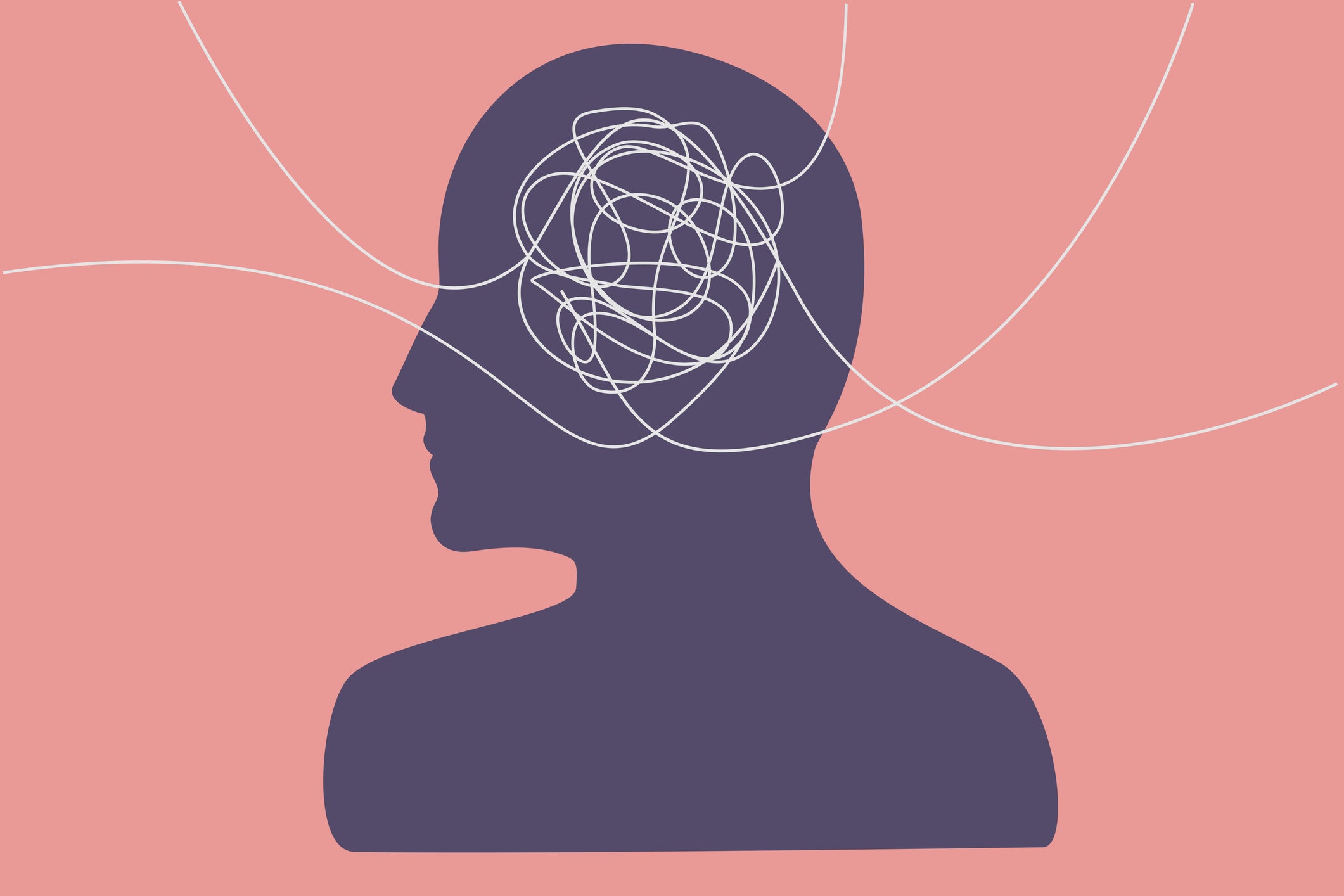Can a pulsating headset really cure depression in 10 weeks?
It’s currently being trialled by the NHS, costs just £79 to rent and could be twice as effective as antidepressants. Hannah Fearn finds out how this device might transform the lives of millions who don’t want to get hooked on medication and haven’t been able to access therapy


Luke Roberts has always struggled with anxiety and obsessive compulsive disorder, which he was diagnosed with at the age of just 13. However, during the pandemic, his mental health took a very dark turn. He was finishing a master’s degree and dealing with the impact of lockdown restrictions while also going through the emotional upheaval of a relationship breakdown.
“Somebody [close to me] said ‘You looked really depressed, and I think you need to seek some kind of help,’ so that’s when I started looking at options,” he explains.
Roberts, from Essex, had tried cognitive behavioural therapy and other forms of counselling in the past, but found that he always fell back into old, destructive patterns of thinking. Yet Roberts, like many, was resistant to trying antidepressant medication, known as selective serotonin reuptake inhibitors (SSRIs).
“I didn’t want to blunt the good stuff just to deal with the bad stuff. I don’t see why you would want to limit the joy in your life. The amount of people I’ve seen get stuck on antidepressants and they don’t know how to come off them, it doesn’t seem to be a fix,” he says.
Looking for alternatives online, Roberts then discovered the Flow headset.
This device – currently being trialled in the NHS, but available to anyone at cost directly from manufacturers – sends a low electric current of 2 milliamps (one milliamp is equal to one-thousandth of an ampere) directly to the dorsolateral prefrontal cortex of the brain to stimulate brain activity.
When someone has depression they often have lower levels of activity in the left prefrontal cortex, which is the part of the brain that regulates our mood. Doctors believe that stimulating this part of the prefrontal cortex strengthens the neural pathways in that part of the brain, raising activity levels and relieving the symptoms of depression.
Test results suggest it is twice as successful at treating depression than traditional antidepressants. So in November 2020, Roberts decided it was worth a go.

“I saw that they had a rental plan so I thought I’d try it,” he says. The plan cost £79 a month to rent directly from the manufacturer and as the device had passed all European safety tests, he was able to do this without any medical supervision or oversight. The ideas was to use the device every day for five days, for 30 minutes each morning as advised by the manufacturers. This would be then followed guidance on an app provided with it to taper down use down over weeks and months.
“There’s a very mild stinging sensation, but in a sense, it’s good because it does feel like it’s doing something. It’s not painful but it can be strange to use at the beginning,” Roberts explains. “It might make your head a tiny bit red at the time – but that doesn’t stay.”
“I had it for about six months, which is the recommended rental plan and, for me it, felt like it started working quite quickly. I had started to forget what joy was but when I started using it, it felt like something had been turned on. At the end of six months, I felt like I’d got to a stable place and then I sent it back because I felt it had done its job,” Roberts says.

The latest trial results of the “transcranial direct-current stimulation” device, seen exclusively by The Independent, show that Roberts’s experience was neither coincidence nor placebo effect. In a randomised controlled trial of 174 patients with at least moderate symptoms of depression, the device alleviated symptoms in 56 per cent of patients in 10 weeks. Statistically, that makes it twice as effective as antidepressants. The trial reported no clinically significant side effects, although some private users posting anecdotal reviews online did complain of stimulation leading to tinnitus and issues with sleep.
Trials were carried out over 10 weeks as medical researchers set this as the optimum period for for measurement of success and to mitigate against false results. Patients are able to report within 10 weeks. If the treatment is working for them, any placebo effects will have dropped off by the end of that time period.
The Flow headset is already available to buy from Boots and other retailers for £399, but can be rented and returned at any time. Meanwhile, the NHS is undertaking five pilots of the device, four in the Midlands and another nationally with the most acutely unwell patients. Another two NHS test schemes are set to launch later this year.

Around 20,000 people across Europe, the majority in the UK, have tried out the device and it is being prescribed as a treatment by psychotherapists and psychiatrists at 150 private clinics. For the NHS, however, a rollout of the technique could save money on prescriptions and improve take-up of treatment.
Dr Azhar Zafar is the GP leading an NHS pilot of the Flow device in primary care in Northamptonshire with around 100 patients struggling with their mental health. He explains: “Anybody who presents with a history of depressive symptoms, either a new onset or an existing depression, and they’re not keen to go on tablet therapy or up the dose of their medicine, then we give them an option [to try it].”
The results, he says, are “broadly positive so far”, with 81 per cent in remission from their symptoms and 95 per cent of patients happy with the treatment. The only side effect reported in the group was a minor headache by a small proportion of users.
Dr Zafar believes the treatment may unlock new avenues for treating other diseases within the NHS that can impact psychological health, such as long-term conditions like diabetes. “Why them? In my experience, they go into a cycle [of negative thinking] and their disease control gets poor. My hypothesis is that if it improves mental wellbeing, it will improve their diabetes control too.”
It felt like something had been turned on. I had started to forget what joy was but when I started using [the headset], I realised I felt quite a lot better
He believes the at-home procedure is part of a new “innovative” wave of treatments for the NHS as the service moves away from face-to-face care in a doctor’s surgery to patients having more control over how and where they manage or treat their condition. “It empowers the patient to treat themselves in a very safe, effective way,” he claims.
Chartered psychologist Louise Goddard-Crawley is interested in new forms of treatment for her patients, many of whom cannot or choose not to use traditional antidepressant medication – particularly pregnant or breastfeeding women experiencing perinatal or postnatal depression.
“The potential risks associated with antidepressants to the foetus or infant may necessitate the exploration of safer and equally effective alternatives,” she says. “Balancing the wellbeing of both the individual and the potential impact on both the mother and child is paramount in such cases.”

The method would also be helpful for those who cannot take SSRIs due to potential reactions with important medications for other underlying conditions or who suffer side effects of oral medication, such as weight gain or sexual dysfunction, which can have a huge impact. “
“Weight gain can impact an individual’s body image, self-esteem, and overall wellbeing,” Goddard-Crawley says. “The emotional numbing or feeling of being ‘wired’ that some individuals experience with antidepressants can affect one's ability to connect with their emotions or lead to a heightened state of restlessness.” At their worst, these side effects can lead to a patient abandoning treatment despite still suffering badly with their mental health.
She hasn't recommended the headset to her own clients yet, but is following the test closely. Perhaps the biggest barrier to rollout is not the results of trials but entrenched prescription habits among GPs and other doctors. Daniel Mansson, co-founder of Flow, says it’s “very difficult” to ask clinicians and other healthcare professionals to change the way they have worked for a long period of time.
“So you have to show within the system that you can apply this to your everyday patients; that it’s very easy to use and very easy for the patient to adhere to the treatment,” he says. As that’s what the latest randomised trial shows, an NHS rollout should not be far behind: patients can expect GPs to be prescribing headsets within three to five years.






Join our commenting forum
Join thought-provoking conversations, follow other Independent readers and see their replies
Comments